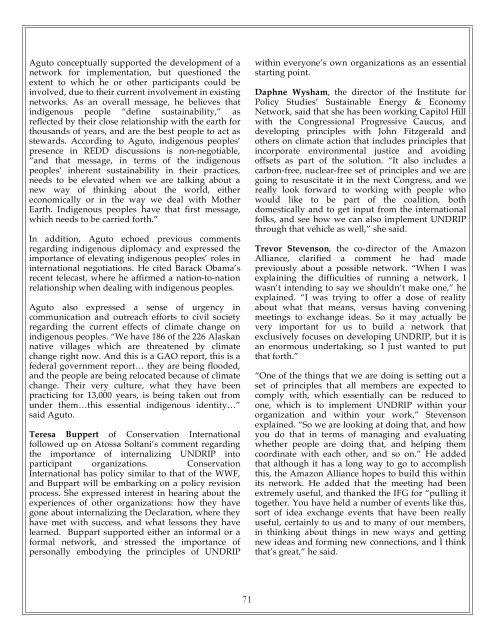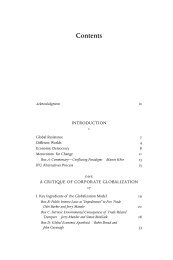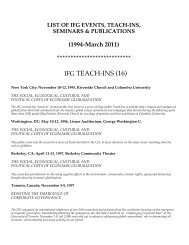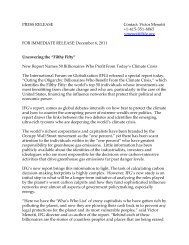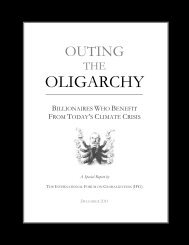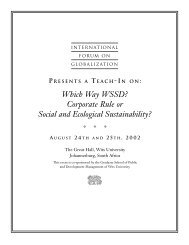UNDRIP Report - English FINAL - International Forum on Globalization
UNDRIP Report - English FINAL - International Forum on Globalization
UNDRIP Report - English FINAL - International Forum on Globalization
Create successful ePaper yourself
Turn your PDF publications into a flip-book with our unique Google optimized e-Paper software.
Aguto c<strong>on</strong>ceptually supported the development of a<br />
network for implementati<strong>on</strong>, but questi<strong>on</strong>ed the<br />
extent to which he or other participants could be<br />
involved, due to their current involvement in existing<br />
networks. As an overall message, he believes that<br />
indigenous people “define sustainability,” as<br />
reflected by their close relati<strong>on</strong>ship with the earth for<br />
thousands of years, and are the best people to act as<br />
stewards. According to Aguto, indigenous peoples’<br />
presence in REDD discussi<strong>on</strong>s is n<strong>on</strong>-negotiable,<br />
“and that message, in terms of the indigenous<br />
peoples’ inherent sustainability in their practices,<br />
needs to be elevated when we are talking about a<br />
new way of thinking about the world, either<br />
ec<strong>on</strong>omically or in the way we deal with Mother<br />
Earth. Indigenous peoples have that first message,<br />
which needs to be carried forth.”<br />
In additi<strong>on</strong>, Aguto echoed previous comments<br />
regarding indigenous diplomacy and expressed the<br />
importance of elevating indigenous peoples’ roles in<br />
internati<strong>on</strong>al negotiati<strong>on</strong>s. He cited Barack Obama’s<br />
recent telecast, where he affirmed a nati<strong>on</strong>-to-nati<strong>on</strong><br />
relati<strong>on</strong>ship when dealing with indigenous peoples.<br />
Aguto also expressed a sense of urgency in<br />
communicati<strong>on</strong> and outreach efforts to civil society<br />
regarding the current effects of climate change <strong>on</strong><br />
indigenous peoples. “We have 186 of the 226 Alaskan<br />
native villages which are threatened by climate<br />
change right now. And this is a GAO report, this is a<br />
federal government report… they are being flooded,<br />
and the people are being relocated because of climate<br />
change. Their very culture, what they have been<br />
practicing for 13,000 years, is being taken out from<br />
under them…this essential indigenous identity…”<br />
said Aguto.<br />
Teresa Buppert of C<strong>on</strong>servati<strong>on</strong> <str<strong>on</strong>g>Internati<strong>on</strong>al</str<strong>on</strong>g><br />
followed up <strong>on</strong> Atossa Soltani’s comment regarding<br />
the importance of internalizing <str<strong>on</strong>g>UNDRIP</str<strong>on</strong>g> into<br />
participant organizati<strong>on</strong>s. C<strong>on</strong>servati<strong>on</strong><br />
<str<strong>on</strong>g>Internati<strong>on</strong>al</str<strong>on</strong>g> has policy similar to that of the WWF,<br />
and Buppart will be embarking <strong>on</strong> a policy revisi<strong>on</strong><br />
process. She expressed interest in hearing about the<br />
experiences of other organizati<strong>on</strong>s: how they have<br />
g<strong>on</strong>e about internalizing the Declarati<strong>on</strong>, where they<br />
have met with success, and what less<strong>on</strong>s they have<br />
learned. Buppart supported either an informal or a<br />
formal network, and stressed the importance of<br />
pers<strong>on</strong>ally embodying the principles of <str<strong>on</strong>g>UNDRIP</str<strong>on</strong>g><br />
within every<strong>on</strong>e’s own organizati<strong>on</strong>s as an essential<br />
starting point.<br />
Daphne Wysham, the director of the Institute for<br />
Policy Studies’ Sustainable Energy & Ec<strong>on</strong>omy<br />
Network, said that she has been working Capitol Hill<br />
with the C<strong>on</strong>gressi<strong>on</strong>al Progressive Caucus, and<br />
developing principles with John Fitzgerald and<br />
others <strong>on</strong> climate acti<strong>on</strong> that includes principles that<br />
incorporate envir<strong>on</strong>mental justice and avoiding<br />
offsets as part of the soluti<strong>on</strong>. “It also includes a<br />
carb<strong>on</strong>-free, nuclear-free set of principles and we are<br />
going to resuscitate it in the next C<strong>on</strong>gress, and we<br />
really look forward to working with people who<br />
would like to be part of the coaliti<strong>on</strong>, both<br />
domestically and to get input from the internati<strong>on</strong>al<br />
folks, and see how we can also implement <str<strong>on</strong>g>UNDRIP</str<strong>on</strong>g><br />
through that vehicle as well,” she said.<br />
Trevor Stevens<strong>on</strong>, the co-director of the Amaz<strong>on</strong><br />
Alliance, clarified a comment he had made<br />
previously about a possible network. “When I was<br />
explaining the difficulties of running a network, I<br />
wasn’t intending to say we shouldn’t make <strong>on</strong>e,” he<br />
explained. “I was trying to offer a dose of reality<br />
about what that means, versus having c<strong>on</strong>vening<br />
meetings to exchange ideas. So it may actually be<br />
very important for us to build a network that<br />
exclusively focuses <strong>on</strong> developing <str<strong>on</strong>g>UNDRIP</str<strong>on</strong>g>, but it is<br />
an enormous undertaking, so I just wanted to put<br />
that forth.”<br />
“One of the things that we are doing is setting out a<br />
set of principles that all members are expected to<br />
comply with, which essentially can be reduced to<br />
<strong>on</strong>e, which is to implement <str<strong>on</strong>g>UNDRIP</str<strong>on</strong>g> within your<br />
organizati<strong>on</strong> and within your work,” Stevens<strong>on</strong><br />
explained. “So we are looking at doing that, and how<br />
you do that in terms of managing and evaluating<br />
whether people are doing that, and helping them<br />
coordinate with each other, and so <strong>on</strong>.” He added<br />
that although it has a l<strong>on</strong>g way to go to accomplish<br />
this, the Amaz<strong>on</strong> Alliance hopes to build this within<br />
its network. He added that the meeting had been<br />
extremely useful, and thanked the IFG for “pulling it<br />
together. You have held a number of events like this,<br />
sort of idea exchange events that have been really<br />
useful, certainly to us and to many of our members,<br />
in thinking about things in new ways and getting<br />
new ideas and forming new c<strong>on</strong>necti<strong>on</strong>s, and I think<br />
that’s great,” he said.<br />
71


